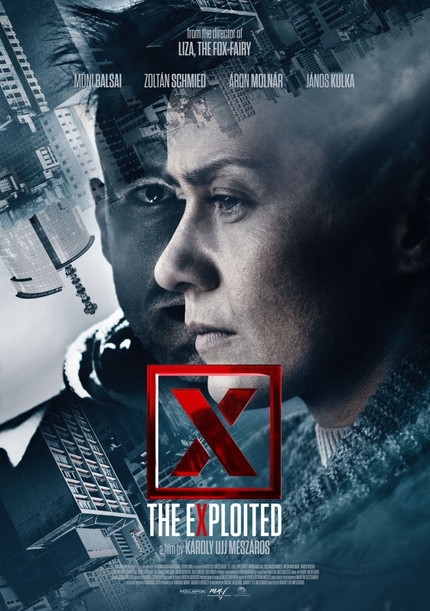Chicago 2018 Review: X THE EXPLOITED, Nordic Crime Goes Eastern European Style
The director of LIZA THE FOX FAIRY dabs into different genre territory in his sophomore feature.

The Hungarian black comedy Liza the Fox Fairy (read the review) ushered another new talent hailing from the homeland of Béla Tarr, Gyorgy Pálfi and Miklós Jancsó, in the person of the writer-director Károly Ujj Mészáros. After the warm reception and award-reaping lap on the international festival circuit, Mészáros finished his sophomore feature x the eXploited, switching gears and trying his hand on a tangled political crime thriller.
Another great talent from contemporary Hungary, director Kornél Mundruczó, surprised lately with a bold stab at the superhero genre, or rather its conventions, embedded within an arthouse drama defined by current socio-political context, Jupiter´s Moon. Nimród Antal flew from Hollywood to Hungary to shoot an action-packed thriller adapting the life story of The Whiskey Bandit (read the review) encapsulating the country´s transition into capitalism in a flashy style. Mészáros moved to a slightly different genre department after his feature debut, while acknowledging he would like to continue in the tradition of domestic genre filmmaking, albeit informed by and reflecting ongoing events.
A body hanging in a room on the outskirts of Budapest has been found. Foul play has not been ruled out. Investigative detective Éva (Mónika Balsai, who starred as the eponymous Fox Fairy in Mészaros´ feature debut) is called to examine the scene. She can´t stand an actual crime scene and prefers to analyze it through photos. Ambitious detective Zoltán, a recent transplant from the countryside to the capital city corps, strikes a deal with Éva. She found a pattern in a string of suicides, cases that have been smoothly and cleanly closed, never to be unearthed again.

The first 15 minutes of punk titled x the eXploited introduces the established conventions of a murder mystery. Co-written with his regular partner Bálint Hegedus, Mészáros forges an unlikely alliance between Éva, a widow with a preternatural talent to analyze crime scenes struggling with her adolescent daughter, mortgage and panic attacks, and cocky Zoltán, who boasts authority mostly because of his gender rather than an actual capacity to burrow through the dirt of crime and corruption in Hungary´s capital city.
After re-starting the investigation into a series of fishy suicides examined by Éva, the kind of person who develops an unshakable obsession with the case, sifting through old police documents and materials in the comfort of her humble dwelling in the after-work hours, the plot thickens as the narrative structure swells with a multitude of storylines.
Flashbacks from Éva's happy days lay down a pretext for her panic attacks and an iron will to investigate outside her jurisdiction. A parallel narrative line, about a wealthy man being tortured and left for dead in an upscale villa, seems completely out of context, although it will soon find its relevance to the central plotline along a sideline strand following the hardships of Éva´s daughter in high school and the painful lack of a father (figure).
Mészáros upends the state of disorder adding regular references to the looming elections, a mysterious figure disseminating an anarchy manifesto, and a shadowy lady who seems to be acting from behind the scenes. The director spends the next 114 minutes folding the many elements and narrative strands into a confluent plotline of personal and national tragedy.
The complexity of the film's structure extends beyond the usual genre conventions, while the influence of Scandi-Noir is easily identifiable from the get-go. What Mészáros is doing is transforming a murder mystery into a political thriller addressing the collective culprit instead of an individual perpetrator. The Whiskey Bandit marked the transition from communism to capitalism and its impact on individuals, while Mészáros approaches the socio-political leitmotif from the opposite perspective, as the echoes and specters of the communist era remain still vitally embalmed and active in the upper echelons under the veil of democracy.
It must have been a daunting quest for Gyula Mózes, who acquired experiences in the editorial departments of Hellboy II, Just the Wind or Metallica Through the Never, to edit Mészáros´ sprawling vision of a crime mystery, political thriller and socio-psychological drama and its several layers and timelines without appearing too labyrinthine for general audiences to navigate. Mészáros' opus thus wields a cyclical structure and the pattern of repetition, not solely as a structural aspect, but encoded into the ultimate message as well.
Cycles, murder doppelgangers and a host of personal side stories of secondary and tertiary characters fold onto the grand design of the sprawling political murder mystery, incorporating a large scope of different perspectives on the same country in a pivotal moment. Contrary to The Whiskey Bandit, which was run mainly as a one-man-show, Mészáros embraces the plural mode denoting society and the nation in an inter-generational chain.

The diffusive narrative arrangement proves a rich ground for red herrings and a couple of longer build-ups may end up in abrupt anticlimaxes. Such tactics remain understandable from the genre viewpoint of the film, however, some instances seem unnecessarily time-consuming. Éva´s panic attacks and anxiety as a defining trait of the protagonist turns out to be a plot device to foster a minor twist and a supply of flashbacks tracing its origin.
More elements of x the eXploited comes from this rulebook, when it is not clear whether they were intended to be an inherent part of the narrative fabric or just a more elaborate plot device. Such schizophrenia consumes Éva´s daughter, who enjoys generous screen time, eventually emerging as a symbol of the young generation. However, the autonomy of the character in the fictional world of x the eXploited gets incrementally suppressed as the plot crescendoes, ultimately winding up merely as a pawn and leverage in political mind games against her mother, thus thwarting the unrolling synecdoche.
Anyhow, Károly Ujj Mészáros made a timely story, inspired by the rift in society, not only divided by recent Orbán iron rule or populist tendencies swirling around Europe and the world. x the eXploited encapsulates fear and anxieties as Mészáros transposes the Nordic Crime formula into Eastern European aesthetics.
The film falls right in between the referential points of genre-driven The Whiskey Bandit and contemplative Jupiter´s Moon, although the middle ground is not that easy to market. The wide palette of characters and their side-plots makes the film a great fit for mini-series template, although the genre audience might find it a bit too long and spread out for its own good.
X.
Director(s)
- Károly Ujj Mészáros
Writer(s)
- Bálint Hegedûs
- Károly Ujj Mészáros







